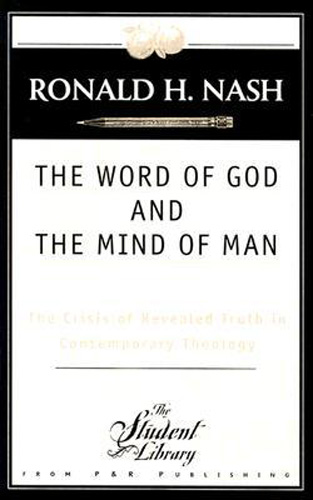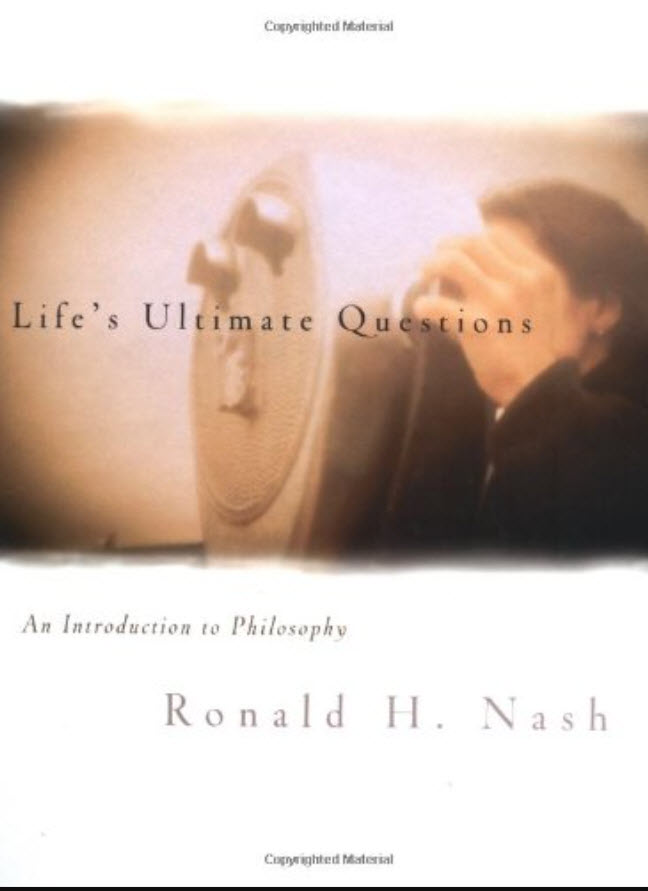History of Philosophy and Christian Thought - Lesson 37
Arguments
Aquinas attempts to prove God's existence.

Arguments
Thomistic Philosophy
Part 3
III. Five Arguments for God's Existence
A. The Argument from Motion (Change)
B. The Argument from Cause and Effect to a First Cause
C. The Argument from Contingent Beings to a Necessary Being
D. The Argument from Degrees of Perfection to a Perfect Being
E. The Argument from Design in the World to a Designer of the World
Introduction
0% Complete- 0% Complete
Thales and Anaximander were two philosophers in the sixth century BC that lived in Miletus.
0% Complete - 0% Complete
Heraclitus and Pythagoras lived into the 5th century BC.
0% Complete - 0% Complete
Any worldview addresses the subjects of God, ultimate reality, human knowledge, ethics and human persons.
0% Complete - 0% Complete
Fundamental beliefs of a naturalistic worldview is that nothing exists outside the physical universe and that all things evolved.
0% Complete - 0% Complete
Plato was a student of Socrates and lived into the fourth century BC. He opposed hedonism, empiricism, relativism, materialism, atheism and naturalism.
0% Complete - 0% Complete
Plato described the universe as having three levels: the world of particulars, the world of forms, and the form of the good.
0% Complete - 0% Complete
Plato's view of the universe was dualistic.
0% Complete - 0% Complete
One of Plato's fundamental arguments is that the human soul is immortal.
0% Complete - 0% Complete
Evaluation of Plato's arguments and comparison of Plato's philosophy with biblical theology.
0% Complete - 0% Complete
Empiricism teaches that all human knowledge arises from sense experience. Rationalism teaches that some human knowledge does not arise from sense. experience
0% Complete - 0% Complete
Aristotle was a student of Plato and lived in the fourth century BC.
0% Complete - 0% Complete
Aristotle rejected Plato's doctrine of two worlds.
0% Complete - 0% Complete
Discussion of Aristotelian philosophy as it relates to the incarnation.
0% Complete - 0% Complete
Aristotle's philosophy as it relates to attributes of God and fundamental assumptions about psychology.
0% Complete - 0% Complete
Aristotle made a distinction between passive intellect and active intellect.
0% Complete - 0% Complete
Discussion of the strengths and weaknesses of the law of non-contradiction.
0% Complete - 0% Complete
Discussion of the nature and substance of matter.
0% Complete - 0% Complete
Hellenistic philosophy was an approach that was popular from the fourth century BC to the fifth century AD.
0% Complete - 0% Complete
Stoics were determinists who believed in living according to nature.
0% Complete - 0% Complete
Hedonism emphasized pleasure as the greatest good. "Eat, drink and be merry for tomorrow we might be dead."
0% Complete - 0% Complete
Philo's philosophy was based on a synthesis of Stoicism and Platonism.
0% Complete - 0% Complete
Implicit "Logos" Christianity is an underlying theme in the book of Hebrews.
0% Complete - 0% Complete
Plotinus lived in the third century AD and is considered the founder of Neoplatonism.
0% Complete - 0% Complete
Augustine is a Latin church father, is considered by many to be one of the most important figures in the development of Western Christianity.
0% Complete - 0% Complete
Augustine wrote Confessions as an autobiographical work to record his experience as a sinful youth and his experience becoming a follower of Christ.
0% Complete - 0% Complete
Augustine wrote to refute some heresies of the day by focusing on the concepts of faith and reason.
0% Complete - 0% Complete
Augustine writes about the problem of evil and describes evil as the absence of good.
0% Complete - 0% Complete
Augustine writes to refute Pelagianism by focusing on the biblical teaching about sin.
0% Complete - 0% Complete
Augustine writes to refute Donatism.
0% Complete - 0% Complete
The fundamental idea of skepticism is that no one can know anything. Augustine this statement contradicts itself because the skeptic is claiming that you can know that you can't know anything.
0% Complete - 0% Complete
When Augustine wrote "The City of God," he had a linear view of history.
0% Complete - 0% Complete
In Augustine's theory of knowledge, he says that eternal reason and human reason are two different levels of reason.
0% Complete - 0% Complete
Augustine was personally convinced of the importance of divine illumination.
0% Complete - 0% Complete
The intellectual background of Thomas Aquinas was influenced by the discovery of ancient manuscripts, the rise of universities, the rise of religious brotherhoods and the rise of Muslim philosophy.
0% Complete - 0% Complete
Aquinas describes faith as whatever a human can know through special revelation, and reason as whatever a human can know outside of special revelation.
0% Complete - 0% Complete
Aquinas attempts to prove God's existence.
0% Complete Aquinas describes four kinds of law as eternal, divine, natural and positive.
0% Complete- 0% Complete
The rationalists and empiricists set the stage for Kant and other philosophers of the modern era.
0% Complete - 0% Complete
Kant argued that moral requirements are based on a standard of rationality he dubbed the “Categorical Imperative."
0% Complete - 0% Complete
Kants two worlds are the phenomenal world and the noumenal world.
0% Complete - 0% Complete
Discussion of criticisms and questions about Kant's ideas.
0% Complete - 0% Complete
Similarities between Kant's ideas and postmodernism.
0% Complete - 0% Complete
The dialectic is a central idea in Hegel's philosophy.
0% Complete - 0% Complete
Ideally, Marxism begins with class struggle, then revolution, dictatorship of the proletariat, withering away of the state, and a utopian classless society.
0% Complete - 0% Complete
Discussion of four faces of Marxism.
0% Complete - 0% Complete
Nietzsche proclaimed that, "God is dead." His cure was to live life knowing there is no ultimate meaning. Kierkegaard emphasized a worldview based on true faith.
0% Complete
In this class, you will explore the rich history of philosophy and its relationship with Christian thought. The course begins with an introduction to the definition and importance of philosophy in Christian theology. You will then delve into the evolution of philosophical thought from the Pre-Socratic era, through the Classical Greek philosophers, and into the Hellenistic period. As you progress, you will discover how early Christian thought emerged and developed during the Patristic period, with a special focus on Augustine. The class continues with an examination of medieval Christian thinkers, such as Anselm and Thomas Aquinas, and concludes with an analysis of modern philosophers like Descartes, Kant, and Kierkegaard, and their influence on contemporary Christian thought.
Two other books that are recommended reading for this class are Confessions by Augustine and Phaedo by Plato.
Recommended Books
The Gospel and the Greeks: Did the New Testament Borrow from Pagan Thought?
Examines contemporary claims for Christian dependence on Hellenistic philosophy, Greco-Roman mystery religions, and Gnosticism. He finds the case for dependence in the...

The Word of God and the Mind of Man
The last two centuries of Christian theology are the record of an evolving attack on the role of knowledge in the Christian faith. The purpose of this book is to challenge...

Life's Ultimate Questions: An Introduction to Philosophy
Life's Ultimate Questions is unique among introductory philosophy textbooks. By synthesizing three distinct approaches

The Meaning of History
The Meaning of History is a concise look at the meaning of the history of the world from the viewpoints of major historians and philosophers. By examining the individual...

Dr. Ronald Nash
History of Philosophy and Christian Thought
th620-37
Arguments
Lesson Transcript
[00:00:02] Aquinas wrote that there are five different ways of proving the existence of God. There are five proofs for God's existence. Aquinas called them the five ways. Let's just open your text. I don't have the time to go through all five of Aquinas as proofs for God's existence. I just don't. But let me show you where we are. We're on page. We're on page one, 72 173, 174. And so on. Okay. Now, here is the catch. The first three proofs for God's existence. Well, let me at least write their names on the board. There's the argument from motion. And what motion means here is change. You can read it in the text. There is. Then secondly, the argument from cause and effect. And that's the argument to a first cause. And then the ah. Then there's the argument from unnecessary being. And you can read the other two ways. At least the first two proofs for God's existence appear as if they are totally dependent upon the impossibility of an infinitely long series. I'll repeat that at least the first two proofs for God's existence appear to depend upon the impossibility of an infinitely long series. Let me give you the the cause effect argument, okay? Everything that happens has a cause. But how far can we take this chain of causes? Obviously, if we could prove that at the beginning of every series, there is a first cause. And thus, if we could prove that there is a first cause for the existence of the world, then we would seem to have an argument for the existence of a creator. God. Example. You all know what a domino is. If you're from another country, I suppose every country has dominoes. It's a little plastic thing that, you know, we used to play a kind of useless game here.
[00:02:43] It's got a number of dots on it that represent numbers. People play with dominoes and they put them on end so that you've got a long series of dominoes standing on end on a floor. Okay. And years ago, we used to have people in this country who would put together extremely complicated and elaborate displays of dominoes such that once somebody tipped the first domino over, you would have da you would have just rows and rows of dominoes going around this, maybe a whole shopping mall. And in the process little guns would be fired and little balloons and, and, you know, I mean, just amazing stuff. All because somebody had set the dominoes up in the right way and then somebody's finger had tipped the first domino over. Okay. Now, imagine a display like that in the Mall of America, which is the biggest mall in the world right now. And so you walk in and you see this display of dominoes and you say, how long has this been going on? And somebody says, well, the first domino fell ten years ago, and you still, you know, got fireworks going off. And you say, can you direct me to the first cause? Boom. Well, that's what's going on here. Suppose when you say I'd like to entered, I'd like to meet the person whose finger was the first cause of all of these dominoes toppling. Suppose somebody says, Well, really, that's not possible, because this series of dominoes is infinitely long. You see, it doesn't just go on here inside the Mall of America. It goes outside the mall and it goes all the way around the world. Don't ask me how. If if the series of dominoes is infinitely long, then there was no first cause.
[00:04:55] Well, wait a minute. If there was no first cause, then there was no first effect. And if there was no first effect, then the the first dominos never would have started. How can you have an infinitely long series of toppling dominoes when nothing caused the first domino to topple? Because you can only have the second domino topple if the first cause if the first domino topple. See? So Aquinas seems to argue that you can't have a series of causes and effects that bring us to this present state in the world. Unless there was a first cause that brought it all. That started all of it. But do you know what that means? That means that for a coin, US philosophy can prove the impossibility of an infinite series. Now, let me repeat that. If you interpret Aquinas as first two proofs for God's existence, he seems to assume that philosophy can prove the impossibility of an infinite series. Here's the problem. Aquinas seems to contradict himself. He tells us on the one hand, that philosophy cannot prove the impossibility of an infinite series. And yet at least two of his famous proofs for God's existence seem to assume that philosophy can prove the impossibility of an infinite series. And that is a logical contradiction. Now, I'm an old man, okay? I started studying philosophy almost before any of you were born. There are a few exceptions. But before most of you were born, back in the 1950s, there were phyla. It was traditional standard going for philosophers to believe that acquaintances proofs for God's existence presupposed the impossibility of an infinite series. Then suddenly woke somebody, woke up and said, Wait a minute. If his proofs for God's existence assumed this and this denies what he said somewhere else.
[00:07:16] There is an essential contradiction in Aquinas, this system. There was then a period of chaos in the interpretation of Aquinas, and people finally said, The only way we can interpret Aquinas fairly is if we understand his first two proofs for God's existence in a totally different way. That then raises the question What does He mean when he says there must be a first mover? What does he mean when he says there must be a first cause? And what I give you and forgive the abbreviated version of this, what I give you beginning on page 175 and 176 is what has amounted to the standard interpretation of Aquinas as proofs for God's existence in the last 25 or 30 years, maybe longer than that. And that is this. And this is just a one sentence summation of what you can read for yourself. The only consistent way to understand Aquinas is first, two proofs for God's existence, as explained in the textbook, is to reduce them to versions or variations of His third proof for God's existence, which is the argument from necessary and contingent being.